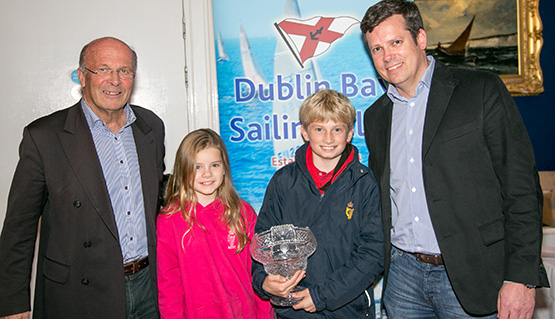Three generations of the Goodbody family from the Royal Irish Yacht Club collected prizes at DBSC's annual prizegiving on Friday night. Tim Goodboby, was the winner of both Thursday and Saturday racing overall in the Sigma 33 class. Son Richard also won both Thursday and Saturday DBSC series in the Dragon class. Grandchildren Max and Georgia Godbody were the RS Feva September Series winner of the Mitchell Cup.
DBSC Hon Sec and Historian, Donal O'Sullivan told the annual gathering 'We start tonight with a slight departure from the usual practice. We're marking this evening a most extraordinary and unheard of event - awarding prizes to three generations of the same family - The Goodbodys - Tim, the grandfather, who has graced the podium before on innumerable occasions, Richard, the son, likewise and now the grandson, Max, for the first time ever at a Dublin Bay event. Grandaughter Georgia shared Max's achievement'.
The prizes awarded were: Timothy Goodbody (in the Sigma 33 /White //M//ischief/) Fireseal Sigma 33 Trophy; J.B. Stephens Trophy; Bective Lights Crystal Trophy Richard Goodbody (with partner Rick Johnson) in the Dragon Diva: Oxford & Cambridge Cup; Old Time Cup; RIYC Cup Max Goodbody in the RS Feva 5241 The Mitchell Trophy
The Dublin Bay Sailing Club (DBSC) prizegiving was a highlight of the Dun Laoghaire sailing season and held at a packed Royal St.George YC clubhouse on Friday evening. Prizes, including an array of ancient yachting silverware, were awarded in all of DBSC's 22 classes by Commodore Pat Shannon.
Full list of DBSC Prizewinners HERE.






























































